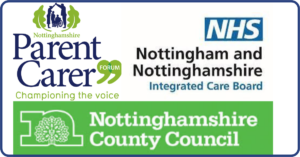

What is the project about?
This national project, called the Partnerships for Inclusion of Neurodiversity in Schools, PINS for short, focuses on helping schools better identify and address the needs of their neurodivergent pupils. It also aims to strengthen partnerships between parent/carers and schools.
Funded by the Department for Education (DfE) and supported by the Department of Health and Social Care (DHSC) and NHS England (NHSE). The programme in its first year aimed to get 40 primary schools in each Integrated Care Board area involved, representing 10% of schools across England.
Year 1
The project in 2024–25 ran from September 2024 until March 2025 and began with 40 primary schools across all seven districts in Nottinghamshire. The schools ranged in size from those with fewer than 80 pupils up to those with 500 pupils.
Feedback from Year 1 has been overwhelmingly positive, with schools praising the practical and engaging training sessions, and parents appreciating the improved communication and support provided by the involvement of the Parent Carer Forum partners.
Year 2
The PINS project is now moving into its second year (2025–26). Nationally, areas that took part in Year 1 are expanding the programme to include more schools, while also offering ongoing support to those already involved. This means that schools can continue to build on the changes they have made, embedding inclusive practice more deeply and sustainably.
Therefore, In Nottingham and Nottinghamshire ICB, 30 new mainstream primary schools will be joining the programme — 20 in Nottinghamshire County and, for the first time, 10 in Nottingham City. Alongside this, an embedding offer will be provided for the 38 schools that remained engaged in Year 1, supporting them to strengthen and develop the progress they have made so far.
Schools involved with the 2024-2025 PINS Project:
- Bishop Alexander Academy
- Gunthorpe C of E Primary School
- Holly Hill Primary & Nursery School
- Jacksdale Primary & Nursery School
- John Hunt Academy
- King’s C of E Primary School
- King Edwin Primary School
- Kingston Park Primary Academy
- Lowe’s Wong Infant School
- Maun Infant & Nursery School
- Sparken Hill Academy
- Sir Donald Bailey Academy
- St Edmund Hillary Academy
- St Mary’s C of E Primary School (Edwinstowe)
- Sutton Road Primary School
- The Bramble Academy
- The St Augustine’ s Academy
- Trowell C of E Primary School
- Whipman Woods Flying High Academy
- Willow Farm Primary School
What does the project do?
PINS brings health and education practitioners and Nottinghamshire Parent Carer forum (NPCF) together in the project to:
help shape whole school SEND provision
provide early interventions at a school level
upskill school staff
support strengthening of partnerships between schools and parent/carers
What are the benefits of the project?
PINS focuses on enhancing knowledge, skills, and environments to better meet the needs of neurodivergent children.
NPCF runs individual participation peer support groups in all of the schools in the project. These groups are open to all parents of children with SEND, not just those with a formal diagnosis. They provide a space for parents to share their experiences and build positive relationships with school leadership teams, creating a lasting legacy of parent/carer communication, engagement and collaboration, to drive positive change within schools.
What will NPCF do in the schools in the project?
NPCF will lead on parent engagement. We are there to ensure that the parent/carer voice is heard and valued.
Our role includes:
- Hosting friendly coffee mornings and participation groups that provide a safe and welcoming space for parents to talk, listen and be heard.
- Sharing a parent survey with families across all the 20 schools to capture views.
- Collecting and sharing feedback with schools to support improvement.
- Encouraging schools to work more closely with families.
- Signposting families to information & support services.
- Working with school staff to find solutions based on parent feedback.
If your child’s school is part of the PINS programme, keep an eye out for the first meeting and parent survey – it’s a great chance to get involved and share your views.
